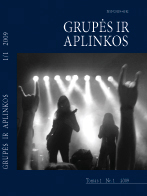Tapatumo kūrimas populiariojoje kultūroje
Identity Construction in Popular Culture
Author(s): Jūratė ČernevičiūtėSubject(s): Cultural Essay, Political Essay, Societal Essay
Published by: Vytauto Didžiojo Universitetas
Keywords: tapatumas; populiarioji kultūra; vartojimas; medijų poveikis; naratyvai; gyvenimo stiliai; idealusis „aš“; identity; popular culture; consumption; media effects; narratives; lifestyles; ideal “self ”
Summary/Abstract: Researchers who analyse the impact of popular culture on identity focus their discussion mostly on questions regarding whether or not the symbols proposed by the mediated popular culture are embraced by the general public passively or actively and creatively. This article deliberates whether the propose symbolic resources are processed by the general public without restraint or whether people prefer to follow the ready-made patterns of popular culture and lifestyle examples which are designed to serve people as a particular frame for identity. The Frankfurt School on the sociological theory of mass culture reveals that popular culture (the so-called culture industry) has a negative impact on the general public. This theory claims that society is passive and willing to consume whatever the culture industries produce as popular culture. This theory regards popular culture as an instrument of social control and manipulation turning its users into a homogenous mass with no individual identity. The contemporary theories of post-modern sociology dealing with the functioning of the mediated popular culture tend to support the idea of identity construction and identity narration. This idea is based on the assumption that the mediated popular culture is an inexhaustible repertoire of cultural resources which are used directly or indirectly in the creation of one’s individual identity. The idea of popular culture as a “container” of identity is based on the assumption that modern societies are lacking in a coherent conception of the “self ” and in authoritative cultural values. Therefore one’s individuality is determined by his or her nearest environment such as peer authority or popular culture (commercials in TV and the cinema, texts in popular magazines and self-help books and other media culture), where the proper identity ideals are sought. Various lifestyles, stories, images and texts which are disseminated in popular culture offer a particular frame for the creation and construction of identity. The users of popular culture “borrow” the material offered to them in order to create the narrations and images of their personal “self ” as well as to choose the particular patterns of behaviour and types of relations. Market-generated images of popular culture determine gender patterns and other roles, proper and improper forms and styles and fashion as well as subtle temptations to imitate and to identify with particular subjective positions while avoiding the others. The overall variety of subjective positions and the possibilities for identity creation in popular culture tend to form unstable identities along with constant innovative discoveries.
Journal: Grupės ir aplinkos
- Issue Year: 2009
- Issue No: 1
- Page Range: 17-28
- Page Count: 12
- Language: Lithuanian

